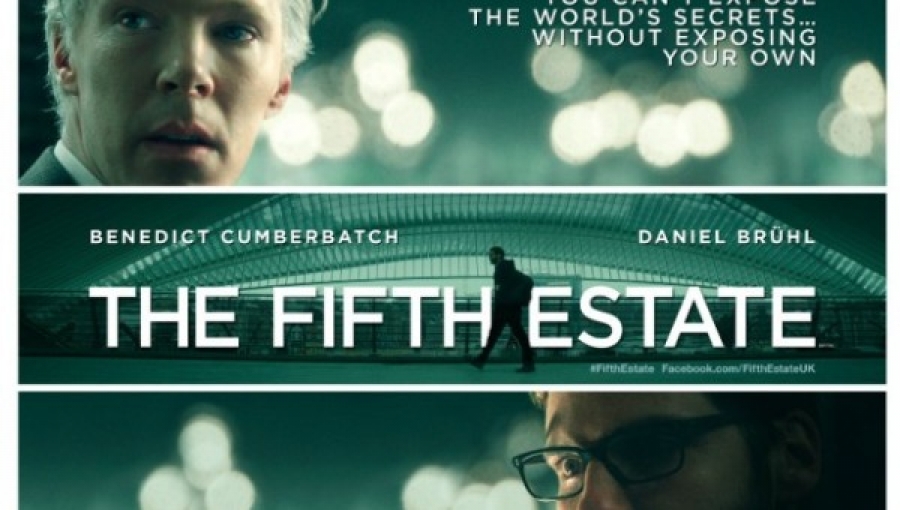I’m not that old, but we are living in an era of American political polarization the likes of which I’ve never seen before. As I write this, we are well into the second week of a government shutdown, and the nation is coming precariously close to defaulting on its obligations, which would hurtle the world economy into a fiscal abyss. We live in a time when we can’t just have a simple difference of opinion and then sit down and solve a common problem. We live in a time in which differing opinions are seen as pure evil, and we certainly can’t be expected to negotiate a solution with pure evil, can we? Heels are dug in, because both sides feel they must win these so-called culture wars or the country is doomed.
It’s this current climate that I think was taken into too much consideration when director Bill Condon’s latest film, The Fifth Estate, was put into production. Making a film about Julian Assange in the political pit of despair that is 2013 America seems to have neutered the project in some fundamental and serious ways. People on the far right look at Assange as a terrorist bent on the destruction of America, while the far left looks on him as a whistle-blowing hero, exposing corruption throughout the world.
The Fifth Estate seems to be the movie version of CNN. Our news media has been so beleaguered with accusations of coddling both liberal and conservative agendas, CNN often just puts two talking heads on the screen and lets them say whatever they want. To CNN, that’s balanced coverage regardless of whether or not either side is even speaking the truth. The media seems increasingly unwilling to upset the cultural apple cart. In making a film about the founder of WikiLeaks, Condon seems to have taken the same approach and called it right down the middle. The result is a movie that is void of any kind of point of view about its subject, which is a shame as Assange is a potentially great subject for a movie.
Benedict Cumberbatch and a succession of wigs star as Julian Assange, but the film is largely seen through the eyes of David Berg, played by Daniel Bruhl, who is also currently in theaters in Rush. Berg meets Assange at a European tech convention and is taken in by Assange’s passion and dynamism. Berg is enlisted to help Assange with a new website called WikiLeaks, a site Assange has created to expose malfeasance around the world. The site offered a platform for anonymity as anybody could go online and pass along incriminating documents. Assange, who has breathtaking issues with boundaries, refuses to edit any of the leaked documents, as he sees editing as the same as censorship. Berg is more cautious and thoughtful and realizes that not redacting certain information, like names of informants and their addresses, could very easily put innocent people in harm’s way. It’s easy to see both sides of that moral dilemma, but, unfortunately, the film refuses to comment on it, which results in an emotionally dull experience.
Things do pick up in the third act when Assange plans to release that enormous pile of American intelligence leaked by Bradley Manning, but, by that point, it’s probably a little too late. It’s not that The Fifth Estate is a bad film, it’s just one that’s maddeningly neutral.
Cumberbatch is one of the most interesting actors in the world today, and he really commands the screen as Assange. You can completely understand why guys like David Berg fell under his spell. Bruhl is quite good, as well. The film also has a great sense of technology, and Condon and his crew do a slick visual job of incorporating texts and tweets onscreen as much of the dialogue plays out in social media. But, the actors seem kind of stranded by a director (or possibly a studio) that wanted to make a movie about this subject matter but were, ultimately, a little bit intimidated by the current social climate. Condon has made a couple of provocative films (Gods and Monsters and Kinsey) that I like a lot. I imagine he wanted to direct those last two Twilight films for the commercial cache to do something like this. It’s odd that he put himself through the professional nightmare of staging Bella’s ludicrous birthing scene, so he could make a movie about Jullian Assange that winds up pulling almost all of its punches. Ultimately, The Fifth Estate feels like a pretty good HBO movie and nothing more, which is a shame considering its volcanic subject.
The more I’ve considered this movie, the more I think of Oliver Stone’s movie The Doors. In that film, Stone was easily able to reconcile his point of view of his subject (Stone clearly loved Jim Morrison.) with negative aspects of his subject. Stone never shied away from showing us that Jim Morrison was frequently an awful human being, but that never stops the film from having a strong point of view about him. I don’t know if the current political climate is at fault.
Come to think of it, how great would 1990s era Oliver Stone’s WikiLeaks movie be? Pretty great.

